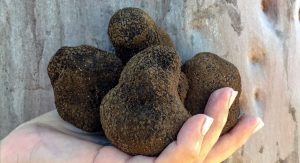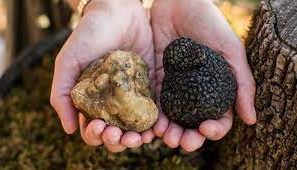Carolina Trufferies Journey: A North Carolina mountain farmer is pioneering truffle cultivation. Brian Upchurch and his team at Carolina Trufferies in Fletcher, NC, want to show chefs and foodies the potential of quality North American truffles.
Brian Upchurch, a veteran horticulturist, ran a successful wholesale nursery on the same property. His son’s truffle idea changed their farming.
Brian and his team learned about truffle farming, which was new to the region. “We’re nurturing symbiosis,” he says thoughtfully. “It’s the intricate interplay between the host tree and truffle that makes the difference.” This fascinating symbiotic relationship could change the perception of truffles as a rare delicacy and revive local truffle cultivation. Brian emphasizes, “Producing truffles is one thing, but our aim is to produce substantial quantities to make it a commercially viable endeavor.”
Brian and his team at Carolina Trufferies believe that North American-grown truffles can be a great choice for chefs and home cooks. Their motivation is producing high-quality truffles.
Brian acknowledges the difficulties of growing such a delicate product. “Truffles are incredibly perishable,” he warns. Freezing reduces value and desirability due to a short shelf life. We want to boost production efficiency and speed truffle delivery. By doing so, we can save money on truffle imports and provide fresher produce nationwide. However, we lack a strong domestic supply chain.”
Brian and his team overcome the obstacles. They’re researching European truffles to find ones that thrive in North Carolina’s climate.
“The majority of truffle research has been conducted in Europe,” Brian says. European truffles require different host trees, soils, and climates. Our methods must fit our climate and host trees.”


READ MORE: Saltwater Sanctuaries Around the World: Explore 66 Breathtaking Saltwater
Brian proudly displays a hybrid chestnut that resists chestnut blight in their greenhouse. “We firmly believe this hybrid chestnut will make an excellent host for our truffles,” Brian says with anticipation. The prized black Perigord truffle, Tuber melanosporum, takes six to eight years to mature.
Despite the wait, Brian and his team persist. They have expanded to a larger farm, which could become one of the nation’s largest truffle farms. While Brian is confident in their truffle business’s long-term success, he admits, “It’s an exciting journey, but it requires a lot of ‘hurry up and wait’ since so much of the magic happens beneath the surface, beyond our immediate sight.”
Carolina Trufferies exemplifies ‘s innovative and adaptable agricultural spirit. Brian Upchurch and his team are dedicated to bringing truffles to the forefront of the local and national food scene by abandoning conventional farming practices.
As their truffle-growing journey continues, they inspire us with their determination and dedication to growing these elusive treasures beneath North Carolina’s scenic mountains. Carolina Trufferies is pioneering the use of North American truffles in gourmet restaurants and home kitchens.
Also Read: Giulia Dragoni Debut: Youthful Brilliance Shines in Italy’s Women’s World Cup Triumph
Our Reader’s Queries
How was truffle discovered?
The truffle, a valuable underground fungus, has been around since ancient times. Some experts even believe that this rare earthy delicacy was enjoyed by the Sumerians and Babylonians, who mixed it with veggies and legumes as far back as the IV-II millennium BC.
What truffles grow in North Carolina?
Examples of these truffle species are the Tuber lyonii or native pecan truffle, and the Tuber aestivum or burgundy truffle. If you are looking for information on cultivating black Périgord truffles, nurseries, or testing services, you may find these links helpful.

